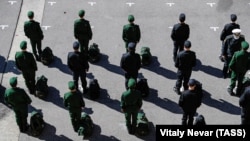Russia’s Defense Ministry has begun testing a COVID-19 vaccine on 50 volunteer military personnel. The vaccine was developed by the government-financed Gamalei Research Center for Epidemiology and Microbiology, which has pledged that it will be ready for public use by early fall.
The Defense Ministry told the state-run RIA Novosti news agency that testing had begun on June 3 on the first group of participants. The tests are taking place at the 48th Central Research Institute for the armed forces’ Radiation, Chemical, and Biological Defense Troops, the site of earlier testing for Ebola and Middle East Respiratory Syndrome vaccines.
All national TV channels in Russia have declared the testing a “victory” for Russian medicine and praised the “courageous soldiers” taking part in the vaccine trials. All of the participants are professional military personnel rather than conscripts, noted Yevgeny Kryukov, director of the Burdenko Central Military Clinical Hospital, Channel One reported.
The participants, who include five women, have all signed agreements stating that they made an informed, voluntary choice to join the trials, Kryukov added.
Defense Minister Sergei Shoygu has promised Russian President Vladimir Putin that the trials will be completed in record time – already by the end of July.
However, Russia’s 2010 law on handling medicine specifically bans military personnel from taking part in trials for any medication intended “for medical use.” The restriction, under section 43:3, includes vaccines.
Trials for medicine developed to address situations during military conflict or in an emergency situation are the only exceptions under the law. Russia, however, has never declared a state of emergency over the coronavirus pandemic.
Attorney Yulia Kazantseva, who specializes in medical law, told Current Time that she sees a problem both in the violation of the law on medical trials and in the ethics of conducting such tests on individuals who, as part of the army, are expected to follow orders.
The law, she underlined, is explicit: “[M]ilitary personnel cannot be brought into medical trials. It doesn’t matter if they’re professional soldiers or conscripts.”
Kazantseva also questioned to what degree the soldiers’ consent was an informed consent.
“Do they understand that it’s a dangerous disease and that testing a vaccine can trigger certain side effects? That’s possible,” she noted.
Kazantseva termed the Defense Ministry’s decision “incomprehensible.”
“I don’t even know how the Health Ministry will give out a certificate for the vaccine, after this,” she continued. “But in our country, acting on the law differs a bit from what’s written in the laws …”
Attorney Aleksandr Peredruk, press-secretary of the St. Petersburg branch of the Committee of Soldiers’ Mothers, an activist group for soldiers’ rights, also questioned the use of military personnel for the trials
“It’s a very strange decision. I have two hypotheses: either we’re not taking something into consideration, or the Ministry of Defense is just violating the law.”
Whether or not the agreement to participate in the trials was truly voluntary is “impossible to trace,” he added.
Current Time sent a request for comment to the Russian Defense Ministry, but, so far, has not received a response.
Immunologist Saveliy Shitikov an employee of the National Research Center for Hematology, sees questions not only about the legality of such clinical trials, but also about their announced timeframe.
“It’s possible, but very complicated, to run clinical trials by the end of July,” he noted. “That’s almost two months, but this is faster than would be desirable in peace time.”
In many ways, though, the soldiers are “very convenient test subjects” for the vaccine, Shitikov pointed out. “Their food, health, and lifestyle are under control. Their medical history is known, and it’s possible to check how they’re feeling at any moment.”
“But I consider that the Defense Ministry is out of line in this issue, and it would have been possible to find other healthy volunteers,” he emphasized. “But this would have taken a lot of time. And here, we have to decide which is more important: the health of the nation or the legality of clinical trials run on volunteer soldiers. If they are, of course, volunteers, but we won’t find this out.”
Based on official data, Russia currently ranks third in the world for COVID-19 infections (after the United States and Brazil), with 441,108 cumulative cases and 5,384 deaths as of June 4.
It has prioritized finding a vaccine. Some 47 Russian institutions are searching for a vaccine, according to the government. The Gamalei Research Center for Epidemiology and Microbiology appears to be the first to start clinical trials.
On May 22, Gamalei Research Center Director Aleksandr Ginzburg stated that his center’s employees had tested the center’s candidate vaccine on themselves. In his words, no one experienced any side effects: “Everyone is alive, healthy, and happy,” he said.
The Gamalei Research Center is developing a so-called vector vaccine, which conveys some elements of COVID-19 into the body; insufficient to spark a coronavirus infection, but able to trigger an immune response.
“The make-up of the vaccine doesn’t represent anything terrifying,” commented Shitikov, who emphasized, though, that “all the same, you have to consider the risks,” including possible side effects.
Biologist Irina Yakutenko, and academician Vitaly Zverev, a research supervisor at Moscow’s state-financed Mechnikov Research Institute of Vaccines and Serums, earlier also warned against rushing the time for trials and evaluation of the vaccine, stressing the safety risks.
“We're rejecting all the standards that allow us to live well, and this is very dangerous,” commented Yakutenko.






Facebook Forum